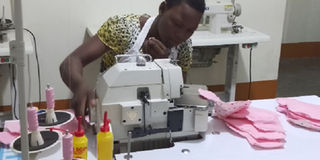Masaka reusable pads factory gives hope to women

Ms Atyero Nimungu makes reusable pads after she was trained by Plan International. PHOTO | PATRICK OKABA
What you need to know:
- Mr Danstan Tugume, the AFRIpads Factory manager, said their recruitment focuses on committed but vulnerable women to enable them transform their lives as they impact others in the community.
A section of vulnerable women in Masaka City have a reason to smile after being employed at a local factory producing reusable pads.
The beneficiaries, who currently constitute 95 percent of the workforce at the factory located at Lwannunda Village, Nyendo-Mukungwe Municipality, engage in different activities, including assembling raw materials, sewing, quality assurance, and management.
Mr Danstan Tugume, the AFRIpads Factory manager, said their recruitment focuses on committed but vulnerable women to enable them transform their lives as they impact others in the community.
“We have so far recruited 85 women here permanently and we promise to continue supporting the mothers,” he said during a stakeholders’ factory tour as one of the activities to mark International Women’s Day last Friday.
This year’s International Women’s Day commemoration was in Katakwi District under the theme: “Accelerating gender equality through women’s economic empowerment.”
“We prioritise women given the nature of the work we do. They all have experience of menstrual life and we believe if they lead this, they will offer hope to others,” he added.
Ms Judith Nassaka, the factory’s chief technician, said she joined the company in 2009 as a casual labourer after being chased by her husband for giving birth to a child with a cerebral pulse disability.
“I joined when I had lost hope but I have been supported to transform from a mere cutter of materials to a technician, who is managing a whole department,” she said.
She added that she is currently able to meet the daily Shs8,500 medical bill for her disabled son.
Ms May Nabwami, the factory’s finishing manager, said after failing to join the university due to financial constraints in 2011, the menstruation experience she encountered at the time drove her passion to accept the work she currently does.
“I could not provide for myself as my parents had passed on. It was a tough experience to the extent that I could not even afford to access sanitary towels. The hope I got after getting this job is the one keeping me moving,” she noted.
Ms Nabwami added that she has been able to pursue a degree in Business Administration which has earned her more ranks and better pay.
Ms Shakirah Nansubuga, the supervisor of the cutting department at the factory, said she had lost hope when her husband abandoned her with two children but joining AFRIpads Factory was the turning point for her.
“I have managed to buy a piece of land in Masaka City, constructed my own house where I stay with my children. I urge my fellow women to appreciate the value of working rather than entirely relying on men,” she noted.
Mr Joris Boon, the chief executive officer at AFRIpads, said their work is in line with various Sustainable Development Goals.
He said he was happy that every year they contribute to the reduction in the number of days lost by school-going girls because of menstrual issues.
“We are proud that we are making a difference in the lives of women not only producing sanitary towels they use during their menses but also providing jobs to them,” he said.
Menstruation management has long presented challenges to girls and women in Uganda due to the taboos attached to it. In many low-income settings in the countryside, menstrual hygiene accounts for the biggest percentage of absenteeism among girls in schools.




